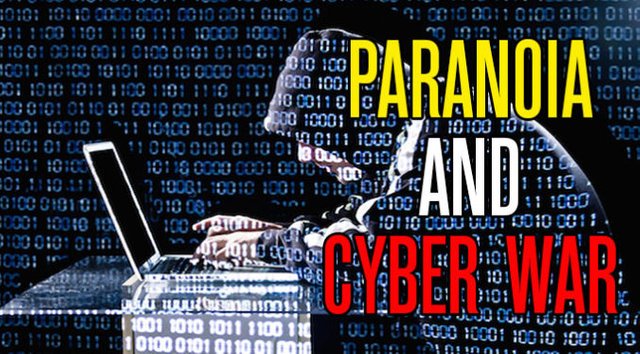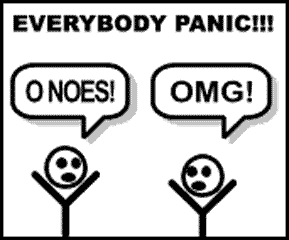"Putin Did It!": Conspiracy Theory Of The Powerful
Sign Of The Times...Of Tumult

(Image from here.)
The Current Year has certainly not been a calm year! As it tumbles to its end, we're seeing two movements loosely pegged as "conspiracy theories" circulate around the Internet. What's most interesting about the pair is that's there's very little overlap between the two. If you're someone who believes that #Pizzagate is onto a child-sex-abuse ring that's covered up, you almost certainly scoff at the theory that the Russian government tipped the election Trump's way. If you're someone who believes that Putin put his man Trump into the White House, you're someone who believes that #Pizzagate is nothing more than a witch hunt.
Given that stereotypical conspiracy theories attract the same kind of character, this disconnect is unusual enough to be noteworthy.
I've penned some thoughts on Pizzagate here. Just below are my thoughts on the Putin matter. Interestingly, a loose prior-probability analysis reveals that 'Putingate' is less plausible than Pizzagate! That's because there's more evidence of prior sex-abuse rings than there is of prior foreign interference in U.S. elections. By this gauge, Putingate is more of a conspiracy theory than Pizzgate is!
The Putin Theory

(Image from here, courtesy of @dollarvigilante )
I'm sure you already know it. Putin's government, through a group of GRU and FSB hackers nicknamed "Cozy Bear" and "Fancy Bear," were the ones that hacked the DNC and John Podesta's Emails and then turned them over to Wikileaks. They did so because Putin wanted Donald Trump in the White House and Hillary Clinton away from the White House. He wanted Trump to win and Clinton to lose, so he fixed the United States Presidential election of 2016.

(Image from here.)
What's Wrong With The Theory: Nasty Gaps
As security professionals like Jeffrey Carr have pointed out, there are subttle but nasty gaps in the Putin theory that make 'Putingate' doubtful. For one, the case against Putin relies on confirmation bias:
The unknown shooter used a Russian-made weapon. Does that mean that the shooter is Russian? Or that the shooter works for the company, Kalishnikov Concern? Or even more likely in the crazy world of cyber investigations, that the designer of the AKM is also the shooter?...
In the physical world of crime investigation, common sense dictates that the perpetrator of a crime may use any weapon and not just one made in the country of his birth, and that the developer or manufacturer of the weapon most likely isn’t the criminal.
And yet, those seemingly crazy assumptions are made every day by cybersecurity companies involved in incident response and threat intelligence....
For another, the Putin theory relies on forgetting the difference between the Russian government and Russians:
Since the vast majority of discovered breaches and cyber attacks that damage networks are conducted by non-state actors, attributing those attacks back to a State becomes a highly complex challenge...
It appears that Russian-speaking hackers were responsible for a number of attacks related to the election, with the exception of the Arizona and Illinois election database attacks. There’s plenty of technical evidence to support that theory. There is also ZERO technical evidence to connect those Russian-speaking hackers to the GRU, FSB, SVR, or any other Russian government department....
And thirdly, the cybersecurity firm who spread the theory has a possible conflict of interest:
We should also bear in mind that private security firm CrowdStrike’s frequently cited findings of Russian responsibility were essentially paid for by the DNC, who contracted their services in June. It’s highly unusual for evidence of a crime to be assembled on the victim’s dime. If we’re going to blame the Russian government for disrupting our presidential election — easily construed as an act of war — we need to be damn sure of every single shred of evidence. Guesswork and assumption could be disastrous.
So the supposed smoking gun is far less smoking or gunny than the MSM would have you believe.

(Image from here.)
Prior-Probability Mismatch
As with Pizzgate, the Putingate theory can be gauged by the use of prior probabilities. Are there cases of foreign-government interference in U.S. politics? If so, do these include electoral interference or something else?
The actual record shows that there have been lots of incidents of foreign interference. But from the standpoint of Putingate, they're the wrong kind.
The cases I've read of, all have this facet in common: they all involve foreign governments wanting something from the U.S. government - or U.S. government officials - but in a way that's agnostic to who's in charge. So long as they can cut a deal, they don't care that much about who they're dealing with.
The typical case of foreign interference is fairly similar to ordinary lobbying. The country of Atlantis wants a sweetheart deal from the U.S. government, so they hire a lobbying firm or spread money around just like a U.S. corporation or interest group. The resultant scandals are less shocking than grubby. The typical pattern of foreign interference is "pay-for-play" - something that the Clinton circuit knows a bit about ;)
There's a second pattern that comes into play when a foreign government wants something that's very serious, like the U.S. entering or exiting a war. When the stakes are that high, the government in question lobby the American people through covert support or public-relations. They don't meddle in U.S. elections; they whip up sentiment amongst the American people who then pressure the government. And even at this grand scale, these campaigns are driven by one specific issue - not an election result. Writ grand, these efforts are the same in kind as the ordinary pay-for-play incidents.
I've only been able to find one example in the post-WW2 world where a foreign power arguably swayed an election result, and it's dubious. In March 1968, Lyndon Johnson decided not to run for re-election after seeing CBS News present the Tet Offensive as a success for the Vietcong - and realizing that his government had a hard time pushing the idea that Tet had been a defeat for the Cong.
This incident is the only precedent to the Putingate theory: the only one. Contrast that to Pizzagate, for which several precedents exist.
It's also doubtful. The claim that "The North Vietnamese swayed the 1968 election by knocking out Lyndon Johnson" depends on ignoring a lot of evidence that supports the counter-claim that Johnson did it to himself. As David Halberstam has documented, there was already a large "credibility gap" pertaining to official U.S.-government information on the war. That credibility gap in itself suffices to explain why President Johnson had "lost Middle America." Official disinformation had gotten to the point where it took down - caught up with - Lyndon Johnson.
You can see the parallels to the Putingate theory...

(Image from here.)
And The Motive
Like most dubious claims, Putingate is a motive-centric theory. Its believers want to you focus on the motive and nothing else. That's why it's been met with a lot of derision in Trump-friendly circles. (Case in point.) Motive is a game two can play!
But there is a psychological explanation for the popularity of the Putingate theory, over and above Russophobia or butthurt. For lack of a better term, the psychological root is a reverse Dunning-Kruger Effect with regards to Internet security.

(Image from here.)
In the standard version, the Dunning-Kruger effect results in blitheness: false confidence. But in the reverse form, when the ignorance is suffused with scare stories, it takes the form of phantom fear:

(Image from here.)
Since all but a small minority of us know next to nothing about Internet security, and because hacks are scary, we fall easily into the idea that a successful and damaging hack could only have been pulled off by a top-notch force of supergenius hackers that are elite members of a foreign military. As Brian Krebs pointed out, the reality is often quite different. In fact, the most successful hacks are undertaken with techniques that are embarrassingly straightforward. But they seem to have been pulled off by using highly sophisticated subtle techniques, so we're prone to believe that only someone like Vladimir Putin's GSU/FSB could have pulled off the DNC and Podesta hacks.

Even the likes of us sometimes find it hard to believe that the real culprits are something like:

Conclusion: Putingate is less believable than Pizzagate
Here's what Pizzagate has going for it: several pedophile rings nestled in powerful circles have been officially found out over the last thirty years. The prior probabilities do show that secret and covered-up pedophile rings - including some really sicko ones - have wreaked their abuse while protected by The System. There are reasonable grounds to question Pizzgate specifically, but as a theory it's not in the nutso side of the pale.
Putingate is more dubious than Pizzagate for two reasons: over the last seventy years, there's only one incident that can be pegged as a precedent; and, the overall pattern of foreign-government interference in U.S. governance shows a method of operation that's quite different from interfering in elections. As sketched out above, foreign interference is issues-driven and typically pay-for-play. It doesn't resemble election-fixing; it resembles lobbying.

(Image from here. Thanks for reading!)
Heh! Nice one!
This post has been ranked within the top 80 most undervalued posts in the first half of Dec 16. We estimate that this post is undervalued by $3.72 as compared to a scenario in which every voter had an equal say.
See the full rankings and details in The Daily Tribune: Dec 16 - Part I. You can also read about some of our methodology, data analysis and technical details in our initial post.
If you are the author and would prefer not to receive these comments, simply reply "Stop" to this comment.
Saw it; thanks!
Interesting post @nxtblg thanks for sharing, congratulations.
Thank you very much for visiting and commenting my post
Hey, glad to!